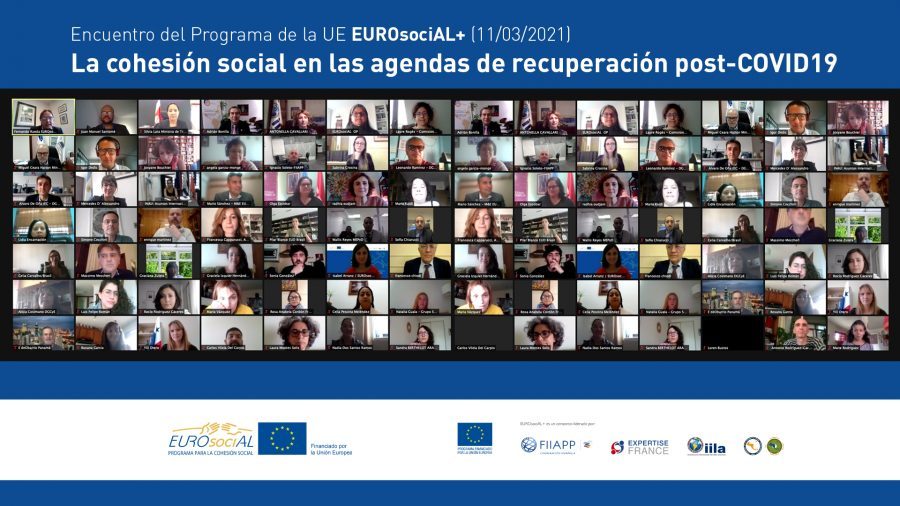The Labour Minister for Costa Rica, Silvia Lara; the Minister of Economy, Planning and Development for the Dominican Republic, Miguel Ceara-Hatton; and the National Director of Economy, Equality and Gender for the Ministry of Economy in Argentina, Marcela D'Alessandro, represented the feelings of the Latin American region regarding the pandemic in this bi-regional meeting organised by the European Union EUROsociAL+ Programme.

Photo: An image of the end of the seminar that was held electronically with an average participation of three hundred people
Designed in Europe and Latin America, these recovery and reactivation plans have common challenges and opportunities, some of the latter are included in the following list: how to deal with the crisis in “welfare systems”, which fiscal policies are necessary for reactivation, how to improve public implementation capacities, how to coordinate public-private investment and how to deal with gender inequality. Which is why, today, the European Union’s EUROsociAL+ Programme held a bi-regional meeting with representatives of government institutions and international partnerships from both sides of the ocean to discuss possible ways to connect an economic relaunch with social investment.
EUROsociAL+ facilitated Europe’s vision via Jolita Butckeviciene, Director for Latin America and the Caribbean with the General Directorate of International Alliances, and Álvaro de Oña, a representative from the General Directorate of Employment, Social Rights and Inclusion, both from the European Commission; and Anna Terrón, Director of FIIAPP (Spain), Antonella Cavallari, General Secretary of IILA (an Italian international organisation), and Radhia Oudjani, Director of the Department of Governance, Justice and Human Rights, part of Expertise France, three women representing the member states present in the consortium.
At the encounter, the speakers considered it essential to reflect on how, at the same time, the recovery plans address economic reactivation and social resilience in a context of greater social demand for collective goods and the general revaluation of what is in the “public” arena.
The Euro-Latin American programme for social cohesion also wanted to give a voice at this meeting to representatives from the important alliances that have been forged in its 15-year history, with the presence of Mario Cimoli, ECLAC’s Deputy Executive Secretary, Alejandra Mora Mora, Executive Secretary of the Inter-American Commission of Women (OAS), Adrián Bonilla, Executive Director of the EU-LAC Foundation, and Yanira Quiteño, Executive Director and Coordinator of the Cabinet of the Secretary General of SISCA (also a member of the EUROsociAL+ consortium).
With an average audience of more than 300 people, this bi-regional exchange showed that, in the face of the pandemic, Latin American countries have applied important mitigation measures, but with responses that do not attack the critical nodes of their societal models. Hence, in the absence of new public policy interventions, gender inequalities, between groups of people and between territories, could deepen. Even before the pandemic, as the speakers pointed out, frustration over low economic growth, lack of opportunities and a discredited political class had manifested itself in elections and in mass protests in different countries.
The especially important role that public policy experts have had and are having in the programme was also represented, on this occasion, by Fabián Repetto, Doctor in Social Sciences.
Prominent also were gender inequalities revealed by the pandemic to which limitations in terms of participation in the paid labour force have been added. Furthermore, this crisis, which is economic and social, has reaffirmed the central nature of care. Likewise, a new stage of social policies begins in order to overcome the current crisis and modernise and expand the welfare systems in Latin America.
And finally, it became evident that, if there is to be resilience, there must also be robust welfare systems to prevent and protect, solve problems relating to inequality and strengthen the capacities of individuals, families and groups. In other words, fiscal, educational and social welfare policies are needed that serve the three functions of welfare systems: social investment, social protection and the stabilisation of the economy.
You can watch the webinar through this link: seminar video



